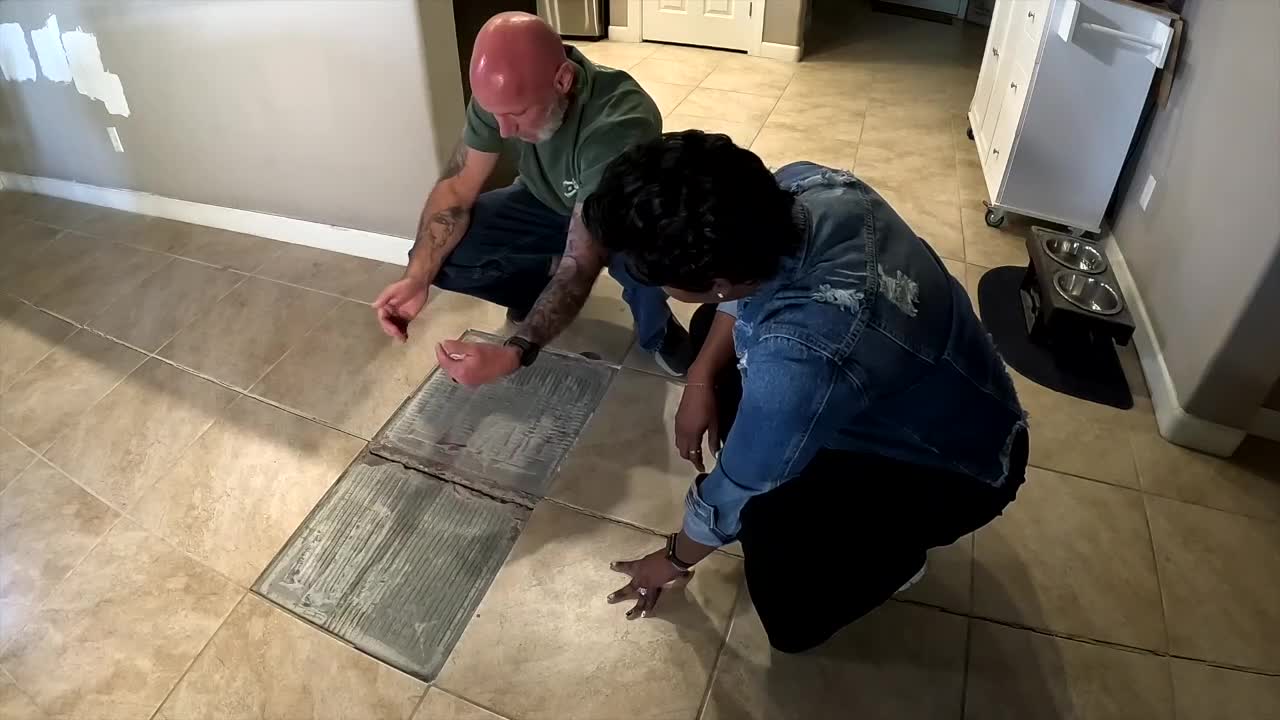Air Force veteran Greg and his wife, Kim, thought they had found their forever home when they purchased a house in Chino Valley in 2020. It was built in 2016, with no major issues reported in the home inspection. The couple never expected what would come next.
"A 10-year-old home should not be falling apart like this. I mean, 30- to 40-year-old homes don't fall apart like this," Greg said.
A few years after moving in, the couple discovered a leak in the foundation.
"This is where it started. This was the initial leak," Greg said.
The couple had the leak repaired, and they thought their problems were over.
"They fixed it, filled the hole back up. We thought that was the end," Greg explained.
But a few months later, they found another leak. When a plumber came to assess the situation, the news wasn't good.
"The plumber came out, and he said, 'I can fix it, but if your foundation moves again, it'll probably crack more lines and more lines and more lines. And the best thing to do is to re-pipe the house,'" Greg said.
Unfortunately, the foundation issues were far from over.
"I saw this 10-foot crack in my tile going across my tile in my back room. That's when I knew that the foundation had moved," he said.
Greg contacted his homeowners' insurance to try to get some costs covered, but the company denied his claim, saying this was contractor negligence, something his insurance doesn't cover.
"The foundation being fixed was $40,000, and now it's going to be 16 to $18,000 to redo my whole entire floor. I'm at almost $70,000 into this house, and insurance isn't going to pay a dime," Greg said.
Frustrated, Greg Let ABC15 Know, and our team went out to see the damage firsthand.
"This basically split apart, like a fault line in an earthquake," Greg said, pointing to the damage.
"There's six of them on this side and three on the back there," he said, counting the visible cracks.
We helped Greg reach out to the home builder, who told us the warranties for the home expired in 2018.
"I mean, I can only imagine this has been frustrating for your you, your family?" asked ABC15's Christel Bell.
"Very frustrating, very frustrating," Greg replied. "It's just bill after bill after bill after bill coming in."
However, just because a warranty has expired doesn't mean homeowners don't have any more rights.
Under Arizona law, homeowners have up to 10 years after a home is built to report a construction defect. If a defect surfaces within that time, the law still protects them, even if the builder’s “limited warranty” has expired.
There's also Arizona's Right to Repair Act, which says a builder has to respond to a written notice of defect before a lawsuit begins. So if the foundation starts failing, the homeowner can still ask that the builder repair the issues or pay for the damage even if the warranty has expired.
“Arizona courts have made it clear: builders can’t wash their hands of structural defects once a short warranty expires,” explains local Scottsdale attorney Gail Barsky. “If a foundation drops and the slab or plumbing fails, that’s a latent structural defect and the homeowner can still seek relief under Arizona’s implied-warranty and right-to-repair statutes.”
Homeowners can send a formal “Notice of Construction Defect” to the builder under A.R.S. § 12-1363, request a review from the Arizona Registrar of Contractors if workmanship is in question, file a complaint with DIFI if the insurer or warranty company denies coverage without a fair investigation, and consult a construction-defect attorney. The law allows recovery of repair costs, expert fees, and sometimes attorneys’ fees.
If something is missed in a home inspection, you may not be on the hook for the repair costs. When hidden defects appear years later, Arizona law calls them latent defects. The statute of limitations doesn’t start running until the homeowner discovers or reasonably should have discovered the problem. So a defect found in year four can still be actionable.
Another thing to consider is talking with neighbors. If several homes in one subdivision have foundation or plumbing issues, it could be a design or construction issue. That opens the door for neighborhood-wide claims, and the Arizona Registrar of Contractors can come and investigate and discipline builders for repeated violations, and engineers’ reports can prove systemic defects. This is also something the Department of Insurance and Financial Institutions and the Attorney General can look into.
The financial and emotional toll has been overwhelming for the family.
"I sometimes go to bed and I can't sleep because of everything that's going on in my head of where are we going to get the money to pay $70,000 for this house that's falling apart," Greg said.
Greg and Kim say they plan to keep fighting to get their money back and are looking at their legal options.
Do you have a consumer problem you need help with? Let ABC15 Know! Email Consumer@abc15.com.






